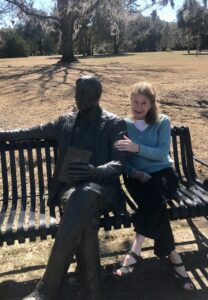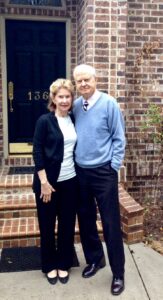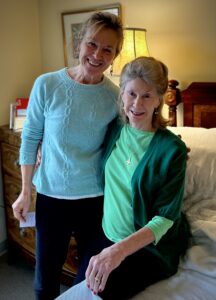
Aunt Lila was dying. She knew this, but often forgot. No one knew when it all began, the cancer that likely sprouted as first a small seed within a dormant ovary, a sleeping grain of terror. Then it grew, and grew, indiscreetly dropping more seeds into the dark womb of her abdomen, until she felt a little pain under a left rib. I was taken aback when I saw her. Her face, which was always so carefully made up, was a pasty greige.
But I didn’t know this when I flew down to South Carolina for a birthday party. Neither did she.
Lila was the youngest and the only one left on my mother’s side. We stayed barely acquainted over the years, meeting on Edisto, a small coastal island with station wagons full of cousins and laughter, bonfires and children skinny dipping at night, the phosphorescence sparking under our feet as we plunged wild with joy into the warm salt water. There were drunks and divorces, then we all grew up and there were some more drunks and divorces. She found me in my 50s waging a familial war with breast cancer, as she had in her 30s. The family tree had some hideous fruit.
Then, as I recovered from surgery and dove into chemo, this lady with the sweetest southern drawl and a lilting laugh like wind through the magnolias, stepped softly into my heart. It was safe. My mother, her big sister Martha, was with me, but so demented now she could not comprehend this chapter of my life with the bald head and a loose hold on living. I knew God wanted me to fight this battle, but my heart was not in it.
“Can I go home now?” I wondered. He was silent because I knew His answer.
It started with cards, then funny books – things to make you laugh at disaster, which is the Murray way. Along with a new baby granddaughter, it was another tenuous tie down to a life I was willing to walk out on. Still feeling the tremors and aftershocks of losing my son, I was worn out.
As Mom faded gently into a wheelchair in a New York nursing home, her little sister struggled with whether to come north, to say goodbye.“She won’t know you anyway,” I assured her. Sometimes we have to say goodbye while we are pulling weeds or washing dishes. Instead, we made plans to meet at our favorite place – Edisto Island. I met her new husband, Billy, a retired but still very active physician who traveled to Haiti on medical mission trips. They clearly adored each other, and I loved to watch how gentle and kind he was to her.
After that, I visited her several times at her home on Pawley’s Island. We ate ice cream out of coconut shells, walked along the same ocean we had both played in as kids, and I watched her dance to rap music. It looked a lot like the cha-cha. My mother, six years older, was everything Lila was not. An intellectual, with a crushed heart wrapped in barbed wire, she ran north from all of the skeletons that kept stumbling out of the closet to Columbia University and endless stacks of books. And she stayed. Where Martha was perpetually frowning and suspicious, Lila was playful and engaging, preferring people to books. Mom was a project for anyone to love, but Lila persisted and I remember them in their 70s giggling like teenagers, rocking back and forth, wiping tears from their eyes.

Billy and Lila took me out to dinner with two other couples on my first visit. They said there used to be another couple but they died. Eventually, the group shrank, leaving sweet and sad shadows behind. When Billy could no longer go to Haiti, he left too, with Lila lying next to him, arms holding on. My aunt’s mind faltered more. She longed for heaven-home, for Billy and Jesus.
“How old was Martha when she died?” she’d ask.
“Eighty-nine.”
“How old am I?”
“Eighty-six.”
Then she would pause and I would try to backfill the silence with some trivial consolation, like, “Well Martha had two strokes.” The subject changed.
In time, her family moved her closer to them, to the same town she and my mother grew up in, Greenville South Carolina. As her 88th birthday drew near, I decided to surprise her and flew down to stay with my cousin. But she was sick that day, too sick to pretend and a cat scan revealed dark shadows scattered throughout her body. I was with my cousin when she told her mother. I could see my sweet aunt absorbing this new truth, her fragile mind trying to comprehend the end of all things. She was strangely silent and withdrawn. As I got ready to fly home, she turned to me and asked again, “How old was Martha when she died?”
“Eighty-nine.”
“And how old am I?”
“Eighty-eight.” She paused, turning this equation over carefully and I wondered if that seemed a tad unfair to a little sister. Then she looked up at me.
“Well, that’s a good long life.” Yes, I guess it is.
At times Lila forgot she was dying, which was so wonderful because her life was crammed with kids and grandkids and their babies. The love overflowed into her 88-year-old heart, a heart that gave and gave and now only had to receive. Many called or came by as the news spread, but she was often out with friends. She outlived a grim prognosis of a month or so by almost three months and then she was just too tired and lay down to die. It was a good death for a great lady, and she looked forward to seeing Billy again and even her difficult big sister.
I can still hear the singsong southern accent as she looked up at me so earnestly when it was time to leave.
“When are you coming back?”
“Soon Aunt Lila.”
How old am I? Old enough to see the long road of life shorten, to think of death. Or maybe to think about forgetting it. I’m so grateful for the sweet lady who drew me back into life and showed me a good way to live and die, to love and be loved fully. Sometimes it takes more courage to laugh than cry. I can see the two sisters rocking back and forth together. It turned out to be a good long life, but a better end, even if Martha was 89.

Saying goodbye.
